New Year's fight. The end of the German Grand Fleet
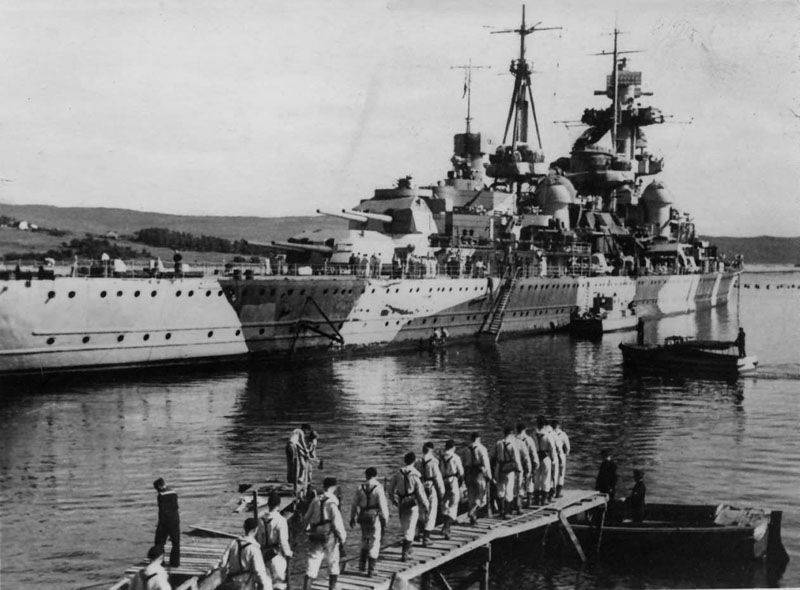
Hitler circled the study in a rage, like a zeppelin over London in the last war. The stream of derogatory epithets, stinging comments, stated in an emphasized irritated tone, did not stop. Not only Kriegsmarine got it - Kaiser Fleet The high seas were remembered both inaction and revolution. The Führer emphasized the contribution that submarines made in both wars to the struggle at sea. In a more calm tone, he added that he considered it necessary to disarm all German heavy ships. Their artillery should be used to strengthen coastal batteries in Norway and France, and the teams should be distributed among the remaining small ships and submarines. Such was the payment for the “New Year’s battle disgrace.” Listening to these streams of reproaches and reasoning, Grand Admiral Raeder asked for permission to speak privately. When Field Marshal Keitel and the stenographers came out, he asked for his resignation. It was January 1943.
"Russian route"
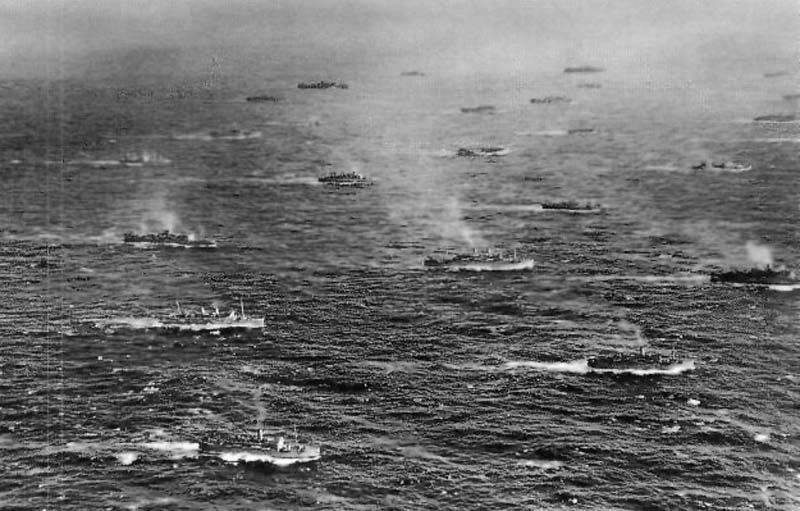
The German command took quite a bit of time to appreciate the full significance of the Allied convoys that came to the northern ports of the USSR. The fate of the war was decided on the Soviet-German front, and the arrival of each caravan, according to the military leadership of the Reich, increased the Red Army’s ability to resist. Hitler considered the very possibility of maritime communications of the Western allies and the Soviet Union through the Arctic waters unacceptable and demanded that a set of appropriate measures be taken to disrupt or completely cease enemy navigation in the North. Germanic forces in Scandinavia gradually increased. Initially, submarines and Luftwaffe units were sent there, and then, in addition, surface ships. The ground forces grouping in Norway was also increased, since for a long time Hitler was convinced of the danger of the British landing force. The defeat of the PQ-17 caravan, not least because of the insolvency of the British naval command, and the serious losses of the next one - PQ-18, led the Western allies of the USSR to impose a moratorium on the wiring of new convoys. The Admiralty was justified by the fact that in the summer and early autumn in the Arctic the polar day lasts, facilitating reconnaissance and detection of ships of convoys. As a last and very solid looking argument, the lords had a frighteningly mystical horror spell called Tirpitz.
Only at the end of autumn - the beginning of the winter of 1942, when the polar night begins in the Arctic, could something be said about the resumption of convoys in the USSR. There is impenetrable darkness over the sea, visibility is limited to just a few miles. The sea, which does not differ in serenity, begins to stormy - it is difficult for the ships to keep the line, they suffer from waves and freezing of superstructures. However, these same factors prevent the enemy from detecting and attacking a caravan approaching the Soviet port. The situation on the Soviet-German front was not easy, and the allies decided to set off the operation of sending the convoy in December. The landing in Algeria and Morocco in the framework of the implementation of the “Torch” plan was successfully carried out, and the British had the opportunity to free up a certain number of warships and transports for other purposes.
Metropolitan Fleet Commander Admiral Sir John Tovey expressed some skepticism about the possibility of sending one large caravan. In his opinion, a large ship connection would be a difficult to manage and cumbersome structure in conditions of constant weather and polar night. There was a serious threat of scattering of ships and, as expected, an easy destruction of them by German submarines. Tovi proposed to form a compact convoy of ten ships maximum, in the protection of which would be the destroyers. But the Admiralty has already opposed such microgroups, fearing their excessive vulnerability. The result of the debate on a technical solution to the issue was a compromise: two convoys were sent to the sea, not as huge as the same PQ-17, but not as small as Admiral Tovi had proposed. The first of them, consisting of 16 transports guarded by 2 destroyers and two cruisers of Rear Admiral Barnett’s detachment (Sheffield and Jamaica), left Loch Yu (Iceland) and arrived safely in the Kola Bay ten days later. The second convoy, JW-51B, was smaller than the first - it had 14 transports, on which 202 were loaded tank, more than 2 thousand vehicles for various purposes, 87 bombers, 33 fighters and 54 thousand tons of cargo. Assuming that there was a threat of any action on the part of the Germans who had overslept the first convoy, the JW-51B escort was larger. It consisted of the 17th destroyer flotilla under the command of 1st rank commander Robert Saint Vincent Sherbrooke (6 destroyers), 2 corvettes, 1 minesweeper and 2 armed trawlers. At the most dangerous section of the crossing, in the vicinity of Bear Island, the convoy was supposed to meet the cruiser Barnett, who would come out of the Kola Bay on December 27. In the event of force majeure (for example, the appearance of the nightmarish Tirpitz), the ships of the Metropolitan Fleet under the command of Admiral Fraser were involved in the operation - the newest battleship Anson, the heavy cruiser Cumberland and two destroyers.
22 December 1942, the convoy JW-51B left Lough Yu and headed for Russia.
From that side
On the same day, thousands of kilometers from Iceland, in the concrete bunker of the Fuhrer's headquarters in Wolfschanger, the next meeting of the top of the Reich was held. In addition to Hitler himself and Keitel's frequenter, the fleet commander, Grand Admiral Raeder, was present. Knowing Hitler’s heightened attention to Norway, which he called the “field of fate”, Raeder, speaking on a report, described the state of the ship grouping in the north of Scandinavia and indicated that he was ready to move to immediate action. The grand admiral stressed that despite the ever-worsening fuel situation, the fleet will try to fulfill the assigned tasks. For example, it was stated that the “pocket battleship” of the “Lutz” was preparing to enter the Atlantic to attack single ships and allied convoys. Hitler responded with a lengthy tirade about the growing threat of landing in Norway - he was obsessed with the idea of the need to more actively use heavy ships. Fuhrer added that he knows about the fuel situation, and the necessary resources for the shock squadron will be allocated.
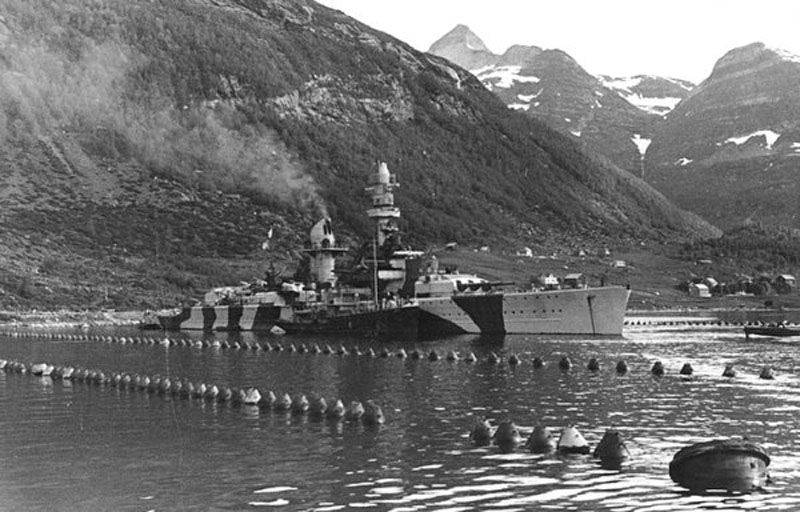
The fleet command drew the proper conclusions from this meeting, at which Raeder was last present as fleet commander. It was necessary to undertake something, especially as agent intelligence reported on the formation of a new convoy in Iceland. The command of the naval group "North" at an accelerated pace developed a plan of operation "Regenboden" (Rainbow). A heavy cruiser “Admiral Hipper” and several destroyers were involved in the strike at the Allied convoy. Joining the “Luttsov’s” raider strike group heated up the telephone lines between the headquarters of the maritime warfare headquarters (Rear Admiral Fricke), the North headquarters group (Admiral Carls) and the squadron commander Vice-Admiral Oscar Kümetz in Alten Fiorde . On the one hand, the fleet commanders "did not object" to the participation of Lyuttsov, on the other, it was emphasized that this is possible only with an "acceptable" risk. And where the line between the risk of “permissible” and “unacceptable” ran was not understood, obviously, even in Berlin.
While the admirals were shouting each other through interference and kilometers of distance, on the morning of December 30 1942 from the U-85 submarine patrolling in the Barents Sea, an urgent radiogram was received about the enemy’s 10 with an insignificant escort. Later this news duplicated U-354. The words “with a minor escort” had a very calming effect on skeptics and anxious personalities, and the German squadron, which was ready for three hours, was given the go-ahead. The crews of the German ships in the Alten fiord languished from idleness: the exits to the exercises were rare and even more rare - military operations, after which weeks and months of anchorage lasted. Unlike their British counterparts, for whom the sea was a boring house, where they felt they were masters, the Germans were only infrequent guests of the ocean expanses. The discipline fell, the professional qualities which were not supported by practice decreased. The panacea for this was only a hike, but the command was almost always determined not to take risks.
Rainbow sunrise
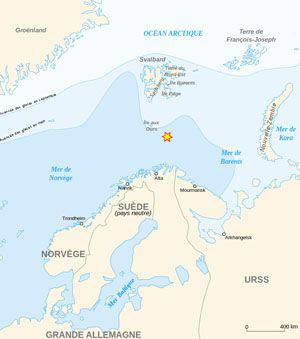
In 17 hours 45 minutes, December 30 1942, cutting the cold Norwegian water with sharp pockets, Kümetz’s ships left Alten Fjord. The squadron consisted of the flagship heavy cruiser "Admiral Hipper", heavy cruiser "Lutz" and 6 destroyers. According to the plan of operation "Hipper" and 3 destroyer struck the first strike on the convoy, diverting the forces of the escort. At this time, "Lutz" and the rest of the destroyers were supposed to attack the remaining vehicles without protection. On paper, everything was quite logical and correct. With the exception of one nuance: the Germans had no idea about the cruisers of Admiral Barnett - "Sheffield" and "Jamaica", who went to meet the convoy. The Germans managed to go unnoticed - none of the British submarines, lounging around the entrance to the Alten Fjord, found them - the stormy weather, coupled with snow charges, had a bad effect on visibility. At night, Kümetz’s ships rebuilt into a marching order, keeping 18 nodes running. The construction chosen by the German commander was original - it was a long line of the front, on the flanks of which were heavy cruisers. Between them at a great distance from each other were destroyers. The total width of such a "net" reached 15 miles and was supposed to provide, according to Kumetz, the greatest surprise when meeting with a convoy. The noticeable disadvantage was that Hipper and Lutz were far from each other, which made interaction difficult. In addition, the destroyers in conditions of poor visibility was not easy to immediately recognize in an obscure blurred silhouette, whose cruiser is next - your own or enemy. Perhaps, if the Germans had enough reconnaissance aircraft capable of detecting and escorting a convoy, while directing a squadron at it, Kümetz would refrain from such experiments. But the polar airfields were almost empty - the Eastern Front was devouring all the Luftwaffe resources.
The long-awaited contact took place on the 7 20 X-minute minutes of December 31 - at a distance of 6 miles from Hipper two unclear targets were discovered. Kümetz ordered an increase in the speed to 24 nodes, while simultaneously turning his nose towards the enemy, in order to impede recognition. New targets appeared, and the German admiral immediately radioed a squadron to all ships of the squadron to begin the operation. As a result, Friedrich Ekoldt, Richard Beitzen and Z-29 remained with Hipper. The rest of the destroyers began to turn to the "Lyuttsov." The guarding of the convoy noticed the presence of strangers later: approximately at 8 hours of 20 minutes, one of the escort ships noticed a couple of destroyers, but took them as Soviet ones (in conditions of poor visibility, obviously, the Friedrich Echoldt was classified as a ship of the 7-Y project) and took no action. After another 10 minutes from the English destroyer Obdyureit, unknown ships were seen for the second time - the captain reported this to Robert Sherbrooke and, at his order, went to meet him. On the 9 clock, the 15 minute of Obdureit requested an identity and an identification signal, still considering that it was in front of the Russians. But in response, shots rang out - along with the settling fountains of water, the last doubts were scattered: a German squadron attacked the convoy. And it is unlikely that her destroyers acted alone. A combat alarm was played on the British destroyers, they began deployment according to a predetermined plan. 4 of the ship, led by the flagship "Onslow" gathered in a group and began to go towards the enemy, the destroyer "Ekites" began setting smoke screen between the convoy and the attackers. With the Admiral Hipper, the British destroyers recorded 9 hours in 10 minutes, but so far they could not determine their numbers - the commander of the cruiser, Captain 1 of rank Hans Hartmann, proceeded from a submarine report about the "insignificance" of escort. In 9.23, on the right, a Ekatees smoke screen was found on the board. The Hipper immediately opened fire with the main caliber, which was soon joined by the 105-mm anti-aircraft guns. For the next 10 minutes, the cruiser fired five volleys, without having achieved, however, a single hit. From the cruiser, two more destroyers were spotted on the course, also from the starboard - it was the flagship of Sherbrooke, Onslow and Orwell. Finally, the 17 commander of the destroyer flotilla and the escort commander of the convoy saw with their own eyes their main enemy. A large unknown ship was heading straight for him, after a while he made a maneuver, allowing him to see his silhouette. The British saw four towers of the main caliber and a massive chimney - the distinguishing features of the German heavy cruiser. There was no point in storing the radio silence, and in 9.39 the cruisers of Admiral Barnett, Connection R, flew a radiogram that the convoy was attacked.
Meanwhile, "Hipper" moved the fire to the British destroyers, rightly believing that they are a more dangerous goal than busy setting smoke "Ekites". The flagship of Sherbrooke, together with his partner, disappeared into the smoke. For the Germans, the shooting conditions were very difficult - the main Hipper radar failed due to a concussion after the first volley. The artillery officer had to rely only on optics, directing the guns to small and quickly maneuvering targets. Sleet in combination with strong gusts of wind turned out to be very harmful for range finders and sights - after each gust the instrument lenses were covered with a thin layer of ice. I had to stop the observation and targeting and wipe them. Then a few minutes to shoot, after which the whole process was repeated anew. This could not but affect the accuracy and speed of the Admiral Hipper artillery fire. Visibility was very poor, and this meant that the German cruiser could not stay a long distance from the convoy and shoot transports with impunity - he needed to shorten the distance, while increasing the threat of being torpedoed with destroyers. Several times "Hipper" had to turn away when the British, emerging from the smoke, appeared in a convenient position for a torpedo attack. By 10 hours of the morning, the cruiser spent almost 90 high-explosive shells, achieving just one hit at Ekatejs, which caused the destroyer some damage.
After 10 in the morning, the mortal bullfighting of the British destroyers against the German heavy cruiser continued. In 10.06, "Hipper", after the smoke, again saw his opponents and resumed a rare shooting. The captain of the 1 rank, Sherbrooke, sent two of his weakest ships, the Obediant and Obdureit, armed with 102-mm guns, back to the convoy, which was going all the way southeast to the waiting Lyuttsov. Sherbrooke himself tried to hold the enemy as long as possible and give the convoy time to depart. "Hipper" in the meantime maneuvered and put into operation its stern radar, the result of which soon affected. In 10 hours 20 minutes 203-mm high-explosive projectile from the cruiser touched the chimney "Onslow". The blast knocked down the radar antenna, fragments riddled the bridge, Sherbrooke being there was wounded. A few minutes later two more shells hit the English destroyer - both nasal guns were put out of action, a fire started in the engine room. A total of 47 people died and were injured by German fire. Wounded Sherbrooke handed over command to lieutenant commander (2 captain of rank) Kinlock, commander of the "Orwell". The destroyers disappeared into a smoke screen. The condition of “Onslow” was heavy: water flowed through a hole in the body, a roll appeared. The fire continued on deck - the turn had to be reduced to 15 nodes. A little later, Orwell received a radiogram from the former flagship that the bow cellars were flooded, there was a fire in the engine room, and that Onslow was moving to the convoy.
Now it seemed that the German plan was starting to work - the escort forces were shabby, the convoy himself retreated right into the clutches of the "Lutzow", whose presence the British did not even suspect. "Hipper" continued to follow to the east, when in 10 hours 36 minutes noticed all the same starboard ship, like a destroyer. However, to the Germans in constant tension, the destroyers seemed everywhere as a source of mortal danger in the form of their torpedo tubes. In fact, an ocean minesweeper Bramble, a small (875 tons, one 102-mm cannon) ship that was on the way of a heavy cruiser, was discovered from a cruiser. From the distance of the entire 3 mile, the Hipper opened rapid fire at his victim, mistaking him for another destroyer. After 6 minutes, Kümetz ordered Ekoldt and Baytzen to finish off an enemy hiding in a smoke screen. The destruction of the Bramble took a long time, and it was only in 11 hours of 20 minutes that Hartmann turned his cruiser south, where, according to the Germans, the convoy was located.
Wolf and watchman
Approximately in 20 minutes before the flagship of Sherbrooke was damaged, the rhododendron corvette in the direct guard of the convoy reported that it sees smoke at a distance of 7 miles. After some time, he also said that he had discovered an unknown ship, which was heading north-east. Lieutenant-Commander Kinlock, who had joined the security forces command, at first considered these data to be erroneous. But soon the second corvette noticed a stranger, accompanied by two destroyers. Two towers of the main caliber, one chimney - it was "Lutz". His commander, Captain 1 of rank Hose, began a rendezvous with the convoy discovered, unaware that the only obstacle on his way was a tiny corvette. Having simply overwhelming fire superiority plus three destroyers with full torpedo tubes, Shlange could not identify the target, as he subsequently reported on in his report, made after the battle, due to poor visibility, smoke and a snow flurry. With the corvette, allegedly, they saw flashes of shots. Remembering Kümetz's order, which actually came from Berlin, “to be careful,” Hose was too careful and scrupulous to observe it. He lay down on a parallel course of the convoy and soon lost sight of him because of a snow flurry. At 11.27, a radio was sent to the Hipper stating that the convoy was lost in smoke and snowstorms. "Lutz" increased speed to go around the zone of bad weather. He missed his opportunity to strike at defenseless vehicles.
Meanwhile, the Hipper speeding up to the 31 node resumed contact with the enemy — it was the destroyer Ekatees that had been damaged earlier. This time the Germans quickly adjusted themselves: already the fourth volley reached the goal - the bridge was destroyed, a large hole appeared in the engine room. More than 40 people were killed. Seeing the position in which the Ekateys found himself, Kinlock rushed to the rescue with his three destroyers, imitating a torpedo attack. In 11 hours 30 minutes German cruiser, sharply turning, gave a volley at the enemy - one projectile landed in the "Obedient". The damaged Ekateys began to sink, in 12.54 its roll reached critical 60 degrees, in 13.15 the destroyer sank - the remaining 80 crewmembers were taken off by the trawler. The decisive moment of the battle has arrived. Escort forces were already significantly weakened, the British destroyers had almost no torpedoes left. In 11 hours 36 minutes Kümetz radioed to the “Lutz”: “I fight with the forces of the escort. There are no enemy cruisers. ” Three minutes later, around the "Hipper" stood a few pillars from ruptures. Their size showed that these were not small guns of the escort destroyers - the caliber was quite large. A new force has entered the battle - Barnett's cruisers were on the way.
"Cavalry" because of the hills
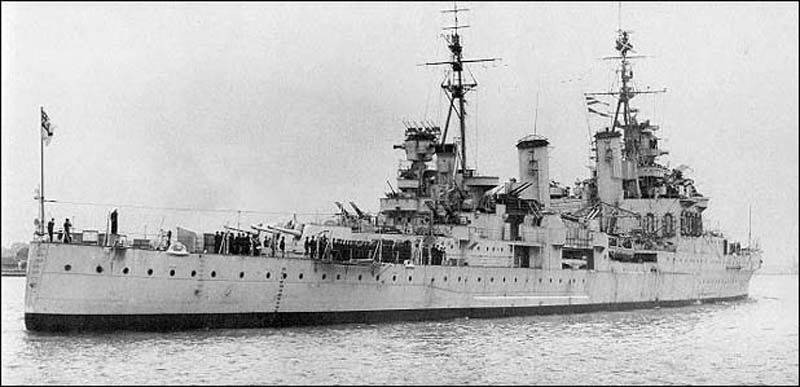
Having recently received a Sherbrooke radiogram about a convoy attack, Sheffield and Jamaica were in full swing to the scene of the battle. Arriving in Murmansk with a previous convoy, they stood for some time in the Soviet port. According to an English eyewitness, it was “a terrible hole with a complete lack of entertainment.” Perhaps the proud son of foggy Albion was saddened that the frontline Murmansk is so unlike any gay port in the colonies where you can find "women and wine."
English cruisers to the events described already had a perfect radar equipment, superior to the German one. The operators recorded a lot of glare on the radar, but Barnett decided to still get close to clarifying the situation. As the distance was reduced among the small marks, one large one began to appear on the screen. It was Admiral Hipper. The first from the cable 60 distance of his opponent was Sheffield. In 11.31, the British opened a quick fire (according to German data, it happened in 11.39). The paling of bursts on both sides of the Hipper came as a complete surprise to Kümetz and Hartmann. Visibility in the area where the heavy cruiser was located was so bad that at first the enemy was not even noticed - the ship’s towers were turned south against the British destroyers. Hartmann ordered a sharp turn to leave new forages on the stern. Performing the maneuver, the Hipper lurched, and at that moment the 6-inch projectile hit the starboard below the edge of the armor belt that had risen from the water - it exploded in the fuel tank opposite the boiler compartment No. 3, damaging the internal bulkhead. Boiler rooms - first number 3, and then number 2 - began to gradually fill with water. 8 boilers failed, the Hipper speed dropped to 15 nodes. He took about 1000 tons of water. In 11.34, according to the records of the British, the Germans returned fire - it was very inaccurate. The fact is that now the ship was going against the wind, and the optics of the nose of the PDC was quickly covered with ice. A few minutes later, two more British shells landed in the Hipper: the first landed on the port side, destroying several rooms, the other one exploded in the hangar - the plane that was there was set on fire, riddled the other, and the other Arado. The smoke from the fires closed the optics of the fuel supply control valves - the fire had to be stopped. Meanwhile, while the “Hipper” fought back from the English cruisers who were suddenly attacking him, the Lutzov, still loafing around, intercepted the caravan that was leaving at full steam to the southeast. And the lead ship was from the German ship at a distance of no more than 3 miles, and the last - about 7 miles. The distance is basically a dagger. “Lutzov” opened frequent fire, but, according to the English sailors, Santa Claus who lived nearby intervened (until the New Year remained 12 hours) - the “pocket battleship” launched 87 283-mm and 75 150-mm shells and did not achieve one hit, only one merchant ship was damaged by shrapnel. Obviously, the matter was not at all in Santa Claus, who had enough worries, simply because the German artillerymen had forgotten how to shoot even for short distances from long standing in fiords.
While “Lutzov” was emptying its cellars, scorching into milk, in the cabin of the “Hipper” they received a very untimely radiogram from the Alten-fjord, ordering “to act without much risk”. But the fact is that the risk, from the point of view of the rarely German expeditions, was at that moment more than enough. Formally, Kümetz's ships had the advantage in firepower over the British: six 283-mm, eight 203-mm and six more 150-mm guns against 24 British 152-mm. But this is only if the Germans fought at long distances, striking the enemy with impunity beyond the reach of his guns. In conditions of poor visibility, when the distance between the two squadrons decreased, the advantage shifted to more rapid-fire English guns. To this we must add the indisputable superiority of the British in equipping their ships with more sophisticated radar and tactically unsuccessful from a tactical point of view Kümetz to divide his forces. After weighing the pros and cons, the German commander decided to withdraw. In 11.37, all ships of the group receive a radio to stop the operation and leave the battlefield. The German destroyers "Friedrich Ekoldt" and "Richard Beitzen" were not lucky, who together completed the massacre of the Bramble trawler. Suddenly, two obscure silhouettes emerged from the darkness, and while “Ekoldt” found out from “Hipper” whether he saw him, “Sheffield” and “Jamaica” (and they were) in 11.43 opened a quick and accurate fire on the head “Ekoldt” “, Turning it into a burning wreck in a few minutes. Soon the German ship sank from damage received. "Baytzen" turned away to the left and, having put a smoke screen, disappeared. "Hipper", connecting with the "pocket battleship", began to retreat to the south-west, slowly firing back from the English cruisers pursuing him. The British achieved the cover of Luttsov, but Barnett did not insist on continuing the battle - he fulfilled his task: the convoy defended and forced the stronger opponent to retreat. In addition, the Lyuttsov 283-mm guns were much more dangerous for his ships. At about 14 hours, contact was lost. The battle is over.
"Hipper" experienced all the great difficulties due to a very painful for him first hit - flooding the boiler department number 3 led to the stop of the left turbine. Water got into the fuel supply lines to diesel generators, and three of them had to be stopped. Soon the fireboxes in the boiler room No. 2 went out. It remains to be seen how this would all end if Sheffield and Jamaica continued their pursuit. Having met the new 1943 year at sea, “Hipper” hobbled da Kaa-fjord in the morning of January 1. During the battle, six people died and died. Together with “Ekoldt”, 340 people died and drowned. Losses of the British reached 250 officers and sailors - from the crews of the sunk "Ekites" and "Bramble". The main thing was that the convoy did not suffer any losses and safely reached the goal.
Storm in Wolfschanger
The New Year's battle had great consequences for the German surface ships, and the consequences are very unpleasant. While the report from the fleet management itself was late, Hitler listened to a news report from the Reuters news agency about the unsuccessful attempt to attack the polar convoy and about the successful actions of the British ships. The Fuhrer was furious. At the most inappropriate moment, when the negative emotions curve went up sharply, a rather brave message was put on the table from the headquarters at sea — it was based on a fragmentary message from the U-85 submarine: “I continue to see red ...” The admirals obviously thought the boat could see a red glow of burning transports, and right there in all instances a message was sent about victory. This dispatch simply caused a storm of rabies in the Fuehrer, who showered the surface ships with a whole squall of mocking nicknames like "useless piles of scrap metal." The Fuhrer ordered to send all surface ships for scrapping and stop building new ones. Fleet Commander Raeder resigned. He was replaced by the "underwater admiral" Karl Dönitz. However, when the waves of anger subsided, Dönitz managed to persuade the Fuhrer to leave the few surviving battleships and cruisers in the ranks - most of them were used as training for the 1944 year in the Baltic Sea, until they had to be used as floating batteries to try to stop the Red Army’s unstoppable offensive. And soon, along with the Third Reich, all the ambitions of the Big Fleet have sunk into oblivion.
Information